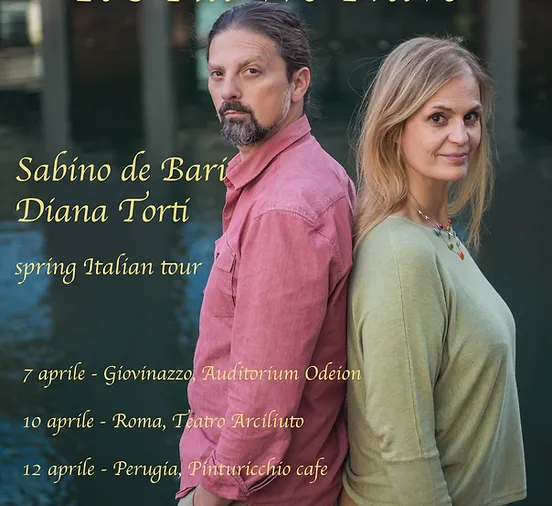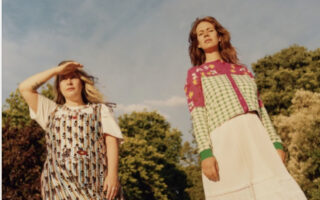
Diana Torti is an improviser, singer, and composer who specialises in jazz but blends ancient music, bel canto, and contemporary repertoire. Her performances have encompassed many prestigious venues, and she has collaborated with Ennio Morricone and Mula Francesco among other luminaries. Her project On A Cloud was mentioned among the best jazz albums of 2019 by the New York City Jazz Record. Her studies in psychology have led her to understand the emotional importance of music. Now a London resident, Torti combines her work as a performer with teaching and vocal research.
Platinum Mind reviewed her album with Sabino De Bari, It’s All We Have, and was not the only column to give it an outstanding review. We caught up with Diana for an interview.
Tell us briefly about your journey in music until now.
I started singing as a teenager, in my school. In the region of Italy I come from there is a strong tradition of Medieval history, and I started collaborating with early music ensembles. When I was twenty, I discovered jazz and became passionate about it. I sang with vocal ensembles and in various bands. I have played at several international festivals, recorded CDs, and collaborated with extraordinary musicians and composers. Then I consolidated my studies at the Conservatory in Jazz Music. I moved to London in 2016. In 2019, my album On a Cloud (SLAM) was a turning point (It garnered amazing and beautiful reviews). Last year, the latest album with guitarist and composer Sabino de Bari, It’s All We Have was released.
Are you able to tell us about any future projects?
Producing original music and recording new albums is one of the aspects that fascinate me most about this job. I especially love the process that leads to the finished musical product, starting from the conception of the project and the writing, which are perhaps the phases I love most. To then continue with the arrangement and creation. I’ve mostly made albums with original music rather than jazz standards, so far, and right now, I’m planning the next album, which I will record later this year. It will contain both original songs and some jazz standards. It’s still in its initial stages, so I can’t tell you more yet, but it will be this summer’s work and should be as a quartet. I think this time I will recover a jazzier atmosphere, which is part of my background and represents me a lot in the musical and personal research of recent times.
What inspires you, how do you find musicians to work with?
The most important aspect of professional collaborations for me is the human one. I can’t ignore the good interaction and genuine honesty between the people I work with. And this is even more true in relation to my musical projects, it is what I look for more than anything and what guides me in developing new collaborations. In recent years I have collaborated a lot with composer and guitarist Sabino de Bari. First, because he is an extraordinary musician and composer from many points of view and with whom I have an uncommon bond. I confess the fact that he is also my partner helped a lot. It’s easy for us to find time to play, experiment with our music, and share ideas. This makes a huge difference because the cohesion and interaction that is created are incredible, and you build it day after day over the years. In the society we live in in recent years we are used to doing everything in a short time and maximizing results with fewer and fewer resources available. Everything must be efficient and fast. But there are activities, such as making music, for which time is essential to get to know each other, experiment, and grow. It is a path built and transformed over time, as in every relationship in life.
The collaboration with Sabino is inspiring. He will have a fundamental role in the next album, even if this time it won’t be the duo we’ve been working on for so many years. I am happy about the interest and appreciation shown in our previous albums’ reviews. We know we are unique with our duo, and we can’t wait to let everyone hear how we are developing our musical ideas!
How is it promoting your music? Do you target specific audiences, or put it out and hope for the best?
When I promote my music, I mainly do it via social media and mailing lists. It’s been like this for some years now.
Although traditional jazz is part of my background, my music tends to explore other vocal possibilities which are also part of my musical experience and tools to express myself. Certainly, I am addressing an audience close to jazz, but it is not easy to target an audience when your music includes many influences that make it difficult to label.
How have you found a label /agent and other people to represent you?
For the recording of some albums, I contacted the record labels that I thought might be interested in my project and I was lucky because in some cases, like for my album On a Cloud (SLAM) I had a positive outcome. The latest albums were released on Tambora Music. For the agent to represent me, I am evaluating some possibilities. I have always acted personally so far, but I like the idea of having someone to represent me, and I am studying various proposals to understand how to orient myself for the near future.
As a female artist, do you feel there is any prejudice or expectations of women that male performers do not have, or do you feel the field is even now?
There has certainly been some progress, but it is still not enough. Jazz remains a masculine and muscular music. It’s not just a question of stereotypes or prejudices among musicians, but also about men who run clubs or programs, review albums, or head record labels. The problem is that by broadening our gaze to the cultural and social level it seems, to me, that many achievements for the rights of all and to guarantee equality for all are once again being called into question. And this obviously also applies to women, who are among the favourite targets of these setbacks. I’m not pessimistic, far from it. But I think we must not be satisfied with what we have done but continue to keep fighting for our rights. On the other hand, I know extraordinary men who not only condemn these attitudes but value women and their work. I think that thanks to their contribution one day we will no longer have these conversations.
If you were to advise a young performer just starting, are there any lessons you might pass on?
I would advise young artists to continue with their dreams despite whatever difficulties they may face. There are many problems in this profession: uncertainty, economic resources that are not always adequate, the commitment to constant practice that accompanies you throughout your life, and I could go on. Probably the most difficult aspect is keeping alive the reason you want to do this job. Even in difficult moments, we must always recreate that feeling that guided us in pursuing this great passion. We are often told that you must be born with talents to be able to perform or create, but I don’t think so. True talent is made of motivation, passion, and determination. And I would also recommend staying in contact with the community, being curious, always questioning and searching.
Looking ahead – what would you like to have achieved in five or ten years’ time music-wise?
I am currently expanding my network of contacts and collaborations to increase my performance activity. I have many ideas and projects to realize, which will require a few years of work, and I am experiencing a professional phase in which I want to realize these ideas. So, I imagine myself busy with recordings and new music to promote. Clearly here in the UK and Italy, but I want to resume performing internationally too. I was lucky enough to play in many countries early in my career and now it’s time to pick up that thread!
If you were to choose one album by any artist or genre that you would like people to hear, what would this be?
This question is too difficult for me and if you asked me again after some time, I would probably change my mind. There are too many albums. Right now, I would tell you Conspiracy by Jeanne Lee, an extraordinary avant-garde jazz singer. It was an important discovery I made some years ago, but I still find it unexplored in some way. It must be listened to.
What would you say are the hardest areas of being a musician?
I could say finding gigs, managing a condition of uncertainty that is not only economic, or finding a balance between the creative part and the reality that surrounds us, are perhaps the problems we face every day. The hardest thing is to keep your motivation and determination alive because you must challenge yourself in everything every day. It is a work within ourselves that requires great energy, balance, and honesty.
Is it difficult to fit music in with other aspects of your life?
Yes, to some extent. Surely, music is a commitment that tends to clash with daily activities. However, music has always been part of my life and I started singing professionally at a young age, so music is simply part of my lifestyle.
Have you found the impact of streaming on making a living from your music to have had any impact?
This has decisively marked the current music industry.
The way music is consumed within society has always changed over time. The problem musicians are experiencing is the speed of the latest changes that are difficult to catch up with while the audience quickly adapts to it. It has an impact on those musicians who have based their profession mostly on the sale of CDs and music. Unfortunately, the music industry requires continuous adaptation to the merciless rules dictated by the market. Being flexible is perhaps the best way to float in a system that is constantly changing. Without giving any judgement, because everyone makes their own story, but the ability to adapt to changes is fundamental in our profession today more than ever. On the positive side, we still sell CDs at our gigs which means part of the audience still wants to give physical support for the music they like, and there are margins for more control of earnings from streaming as well.



